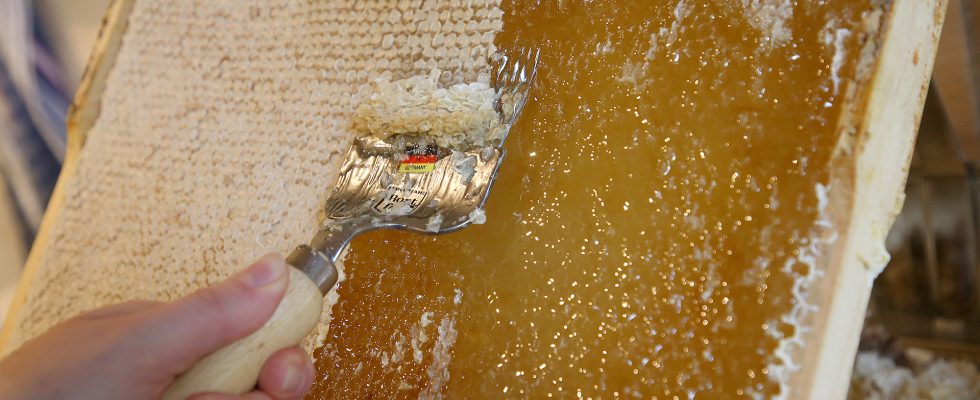Status: 04/14/2023 1:54 p.m
The jar of honey on the breakfast table is a must for many. The Germans consume far more than is produced in this country. And yet the German beekeepers are faced with a whole range of problems.
Honey is one of the most popular spreads in Germany. In 2021, every German consumed an average of 800 grams. Actually a reason to celebrate for Markus Lay from the Saarland Beekeepers Association. According to Lay, the number of bee colonies has also increased almost continuously over the past ten years: According to estimates by the German Beekeepers’ Association, 989,891 bee colonies were being kept nationwide by 149,105 beekeepers at the end of 2022.
And yet things are looking anything but rosy for honey production in Germany. Not only does adulterated imported honey push down prices and make beekeeping unattractive. Due to the bad weather and diseases, the honey yield per bee colony fell from 29.8 to 19.2 kilograms in 2021.
Hobby beekeeper instead of main job
Beekeeping is, at least in Germany, mostly a hobby. According to Lay, there is only one professional honey producer in Saarland, and that with 2,102 organized beekeepers.
Because you can’t make big money with honey in Germany, even if the sweet syrup is so popular. “In order to even cover the work, the honey should have cost 20 euros for years. But of course nobody pays that,” says Lay.
The Saarland is still in a good position in a national comparison: While there are only 2.8 bee colonies on average nationwide per square kilometer, there are 4.1 here – according to the Saarland Beekeepers’ Association, ideal for pollination of nature. It looks a lot worse in Brandenburg, for example. There, a single colony of bees has to cover more than one square kilometer.
Population has been recovering since 2010
There are also historical reasons for this: With the fall of the Wall in East Germany, there was no financial state support, and beekeeping collapsed there. In the old Federal Republic, beekeeping had lost its attractiveness since the 1950s. Around 1950 there were still an estimated two million bee colonies, at the time of reunification there were only 1.2 million.
The low point came in 2010 with only 750,000 bee colonies. From then on things slowly went uphill again, also because the public awareness of the death of bees, the worldwide decline in honey bees and the resulting lack of pollination of plants.
Good honey? Best from the beekeeper around the corner
If you want to buy good quality honey, Lay advises going to the local beekeeper. The associations usually have lists ready on their websites. If you still want to shop in the supermarket, you should at least pay attention to a clear designation of origin. Honey, for example, that is declared “from Germany” must also come from here by law.
The problem: the honey is often declared as a “mixture of EC and non-EC countries”. “In principle, everything can be in there,” says Lay. This does not necessarily mean poor quality, there are also organic honeys made from such mixtures. “But it’s just difficult to know where this honey comes from.”
It is then also unclear whether the honey contains foreign pollen. For example, food allergies could develop with pollen from foreign countries, for example if there is an increased amount of rhododendron pollen.
Pollen and invasive species problems
In addition, the beekeepers are concerned that diseases will also be introduced through the imported honey. Even if the risk is low, bees could fly to glass containers with unwashed honey jars, in the remains of which there are still spores of American foulbrood, and thus introduce this bee disease to the colony – a catastrophe for the beekeeper.
Introduced species such as the Asian hornet (Vespa velutina) are also a major problem for native honey bees. In the Saarland it has been affecting the bee colonies for two years, but it has also arrived in other federal states. Exact numbers are not yet available.
However, Lay is not hopeless for the future of beekeeping. The number of beekeepers is increasing and the average age has also fallen. “Due to the media coverage of the death of bees, many younger people have started to do it again.”

